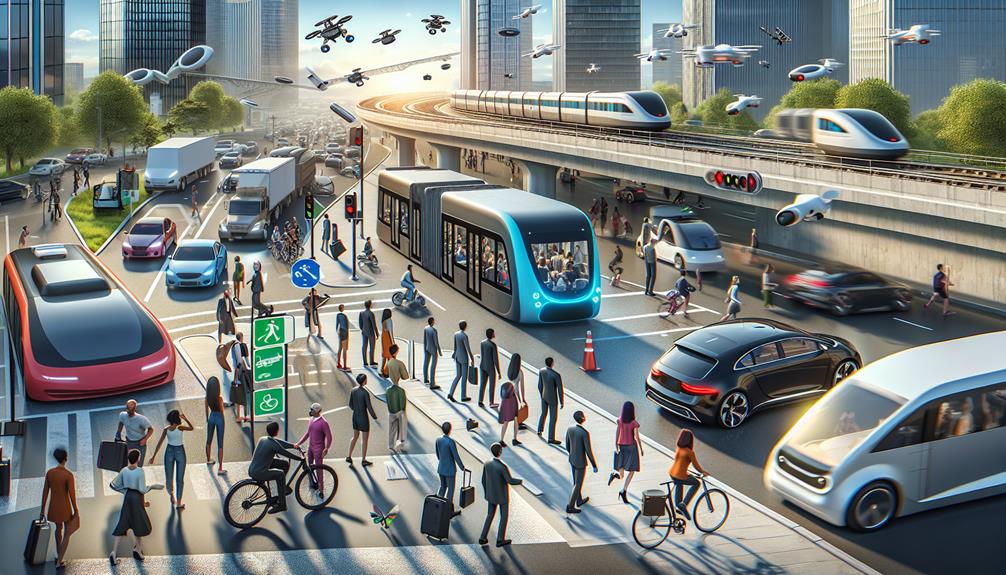Imagine you’re interacting with an AI chatbot that not only grasps the gist of articles but also contextualizes the information based on your past interactions and preferences. With chatbots evolving to understand and analyze content, consider the implications for your daily information consumption and decision-making processes. As these technologies advance, they could transform educational tools, refine customer service experiences, and personalize content in unprecedented ways. What does this mean for the future of digital communication? How will this shift affect the balance between human and machine collaboration? Let’s explore what lies ahead as AI becomes increasingly woven into the fabric of our digital lives.
AI Chatbot Technology
The evolution of AI chatbots has fundamentally transformed the landscape of digital interaction, offering unprecedented engagement and efficiency across numerous sectors. Companies across various industries are increasingly turning to AI chatbots to enhance customer experiences, streamline operations, and reduce costs.
For instance, a case study from Sephora illustrates how their AI chatbot, Sephora Virtual Artist, has revolutionized the beauty shopping experience. By leveraging augmented reality and AI, the chatbot allows users to virtually try on makeup products, providing personalized recommendations based on user preferences and skin tones. This application has not only increased user engagement but has also led to a significant boost in online sales.
Evolution of AI Chatbots
AI chatbots have undergone remarkable advancements, evolving from basic rule-based systems that operated solely on predefined scripts to complex entities capable of natural language understanding. Today’s chatbots utilize machine learning algorithms and deep neural networks, enabling them to grasp context, sentiment, and user intent, thereby delivering more relevant and insightful responses.
According to a recent Gartner report, by 2025, 75% of customer service interactions will be powered by AI chatbots, underscoring their growing significance in customer support. As they learn from vast datasets, these AI systems can now provide contextually rich and human-like interactions, making them essential tools in sectors such as e-commerce, healthcare, and finance.
Moreover, the integration of third-party APIs has expanded the capabilities of AI chatbots beyond mere conversational interfaces. For example, chatbots can now seamlessly book appointments, process transactions, and offer real-time updates, all within a single interaction, enhancing user convenience and satisfaction.
This level of automation demonstrates the remarkable strides in AI chatbot technology, which is continuously fueled by ongoing research and technological advancements.
The Impact of AI Chatbot Articles
AI chatbot technology significantly enhances user experiences by delivering instantaneous, context-aware responses that personalize interactions. A study from Salesforce found that 69% of consumers prefer chatbots for quick communication with brands, demonstrating the effectiveness of these technologies in fostering engagement.
Enhanced User Experience
Integrating AI chatbots into customer service frameworks has proven to enhance user experience by simplifying information retrieval. The result is faster response times and more relevant information, significantly reducing customer effort and increasing satisfaction. For instance, H&M’s chatbot assists customers in finding products based on their preferences, which has led to a more efficient shopping experience.
Furthermore, these AI systems continuously learn from user interactions, refining their algorithms to better understand and anticipate customer needs, ensuring that each interaction is increasingly tailored and effective.
Revolutionizing Content Consumption
AI chatbot technology is reshaping content consumption, enabling users to access and process information more efficiently. These systems utilize deep learning algorithms to analyze vast amounts of data, allowing for dynamic interactions that cater to individual preferences and queries.
AI chatbots can assess user behavior and past interactions to suggest relevant content, delivering it in a concise and engaging format. This approach not only streamlines the learning process but also ensures users engage with the most pertinent material. For instance, Spotify’s chatbot offers personalized playlists based on listening habits, enhancing the user experience significantly.
Moreover, the ability of chatbots to understand context and nuance amplifies their effectiveness in managing complex inquiries. This contextual understanding enables them to provide tailored explanations and insights that are not only accurate but also relevant to the user’s unique situation.
As AI chatbots become integral to information consumption, users will find it easier to convert data into actionable knowledge, enhancing both comprehension and usability.
AI Chatbots in Education
In examining AI chatbots in education, you observe their potential to transform learning processes by integrating adaptive learning technologies that tailor educational content to individual student needs.
These chatbots facilitate personalized learning experiences, effectively catering to diverse learning speeds and styles. This technology not only enhances student engagement but also optimizes educational outcomes through customized interaction and feedback mechanisms.
Transforming Learning Processes
AI chatbots are revolutionizing the way you engage with educational content, streamlining learning processes and enhancing interactivity. These sophisticated tools leverage advanced algorithms to digest and explain complex information, transforming traditional learning paradigms.
By integrating seamlessly into digital platforms, chatbots facilitate instantaneous access to knowledge, answering queries and providing explanations with unprecedented speed. This capability not only accelerates the learning curve but also reduces the cognitive load on you, allowing for more efficient information processing.
Moreover, AI chatbots are redefining the role of educators. Instead of spending substantial time on routine inquiries, educators can now focus on developing deeper, more critical educational strategies. Chatbots handle the repetitive aspects of teaching, such as grading and basic question-answering, thereby freeing up valuable instructional time.
This shift enables a more analytical approach to pedagogy, focusing on enhancing reasoning skills and critical thinking rather than rote memorization. In the context of educational logistics, chatbots optimize the allocation of resources. By analyzing student interactions and performance data, these AI systems can identify bottlenecks in the learning process and suggest improvements, ensuring that educational institutions operate more efficiently.
This not only maximizes educational outcomes but also minimizes wasted efforts and resources.
Personalized Learning Experiences
You’ll find that adaptive learning algorithms play a crucial role in enhancing AI chatbots in education.
These algorithms analyze your interactions and learning pace to tailor content that suits your educational needs, promoting a more efficient learning curve.
Adaptive Learning Algorithms
Adaptive learning algorithms tailor educational content to meet your specific learning pace and style, enhancing engagement and efficacy.
These sophisticated systems analyze your performance, preferences, and interaction patterns to dynamically adjust the curriculum. This personalized approach guarantees the best content delivery, maximizing your learning potential.
AI Chatbots and Business Applications
You’ve observed how AI chatbots transform customer service by providing rapid support and efficiently handling queries.
Their role extends to automating marketing and sales processes, ensuring that resources are allocated with precision.
Additionally, chatbots serve as effective tools in lead generation, engaging potential clients through dynamic interactions.
Customer Service and Support
You’ll find that AI chatbots greatly enhance customer interactions by streamlining communication and reducing response times.
These technologies employ advanced algorithms to interpret and respond to user queries with a high level of accuracy and personalization.
AI Chatbots Enhancing Customer Interactions
AI chatbots are revolutionizing customer service by providing rapid, consistent, and round-the-clock support for users seeking assistance. They’re programmed to analyze queries and retrieve information from vast databases, ensuring that you receive accurate responses instantly.
Additionally, they learn from interactions, improving their ability to resolve future inquiries more effectively. This continuous enhancement leads to a more personalized and efficient customer experience.
Efficiency in Handling Queries
Chatbots play a vital role in improving the efficiency of query handling in business environments by providing immediate and accurate responses. When you integrate these AI tools into your customer service framework, you’re leveraging technology to streamline processes and enhance user engagement.
These chatbots are programmed with algorithms that analyze and interpret customer inquiries quickly, leading to faster resolution times compared to human operators. You’ll find that chatbots can handle a vast array of queries simultaneously, reducing the workload on human staff and minimizing wait times for customers. They’re equipped to identify keywords and phrases in the queries they receive, ensuring that responses aren’t only prompt but also relevant and helpful. This capability is essential for maintaining a high level of customer satisfaction and operational efficiency.
Moreover, the data collected from interactions with chatbots provides valuable insights into customer needs and behavior. This data analysis allows for continuous improvement of the chatbot’s response algorithms and the overall customer service strategy. With each interaction, the system learns and adapts, refining its accuracy and helpfulness.
You’re not just installing a solution for today but investing in the ongoing optimization of your business’s customer interaction capabilities.
Marketing and Sales Automation
You’ll find that AI chatbots are increasingly pivotal in deploying targeted marketing campaigns. They leverage consumer data to personalize interactions, ensuring that marketing efforts aren’t only more efficient but also more effective.
Targeted Marketing Campaigns
Harnessing the power of AI chatbots allows businesses to streamline targeted marketing campaigns with enhanced precision and efficiency. You’ll benefit from their ability to analyze vast datasets, identifying patterns and insights that fine-tune your strategies.
They’re programmed to adapt in real-time, optimizing messaging based on customer interactions. This not only boosts engagement but also greatly increases conversion rates, maximizing your marketing ROI.
Lead Generation through Chatbots
Often, businesses employ AI chatbots to effectively generate leads by engaging potential customers through interactive and personalized conversations. These AI systems use sophisticated algorithms to analyze user inputs and tailor responses that align with specific business needs. By leveraging natural language processing (NLP) and machine learning (ML), chatbots can identify potential leads’ intents and interests, enabling a more targeted approach.
You’ll find that the integration of chatbots into your lead generation strategy isn’t just about automating conversations; it’s about optimizing interaction quality at every touchpoint. Chatbots can qualify leads by asking pertinent questions and scoring responses against predefined criteria. This methodical vetting allows your sales team to focus on high-potential leads, thereby increasing the efficiency of the sales process.
Furthermore, chatbots collect and analyze data from interactions, which can be pivotal for refining marketing strategies. This continuous loop of feedback and improvement helps fine-tune both the chatbot’s responses and your approach to potential customers.
The Future of AI Chatbot Articles
Lastly, consider how advancements in natural language processing can enhance the bot’s understanding and generation of complex texts.
Analyze the potential integration of augmented reality with AI chatbots, which could transform how information is interacted with and consumed.
Advancements in Natural Language Processing
As you examine advancements in natural language processing, consider how enhanced conversational abilities in AI chatbots are redefining interactions. These capabilities allow chatbots to understand and respond with greater context sensitivity and adaptability.
This shift not only improves user experience but also broadens the scope of tasks AI can efficiently handle.
Enhanced Conversational Abilities
Advancing natural language processing technologies are dramatically enhancing AI chatbots’ conversational abilities. You’ll notice they’re becoming adept at understanding nuances in language and context. This improvement means they can engage in more complex, meaningful exchanges, almost mimicking human-like interactions.
With each upgrade, they’re better at recognizing emotional cues and responding appropriately, making your interactions with them increasingly seamless and intuitive.
Integration with Augmented Reality
As you explore the integration of AI chatbots with augmented reality, consider how this combination can create immersive user experiences.
By overlaying real-time, AI-driven responses onto your visual field, you enhance not only information accessibility but also user engagement.
This synthesis promises to redefine interaction paradigms across multiple platforms, introducing a more dynamic and intuitive method of consuming content.
Immersive User Experiences
Often, integrating augmented reality (AR) with AI chatbots can revolutionize how you interact with digital content, offering a more immersive and interactive experience.
You’ll find that AR layers complex data into your real-world environment, enhancing the way you absorb information.
This synergy not only boosts engagement but also improves understanding, tailoring interactions to your personal learning style and immediate contextual needs.
Ethical Considerations and Privacy Issues
You must consider how AI chatbots handle your data, especially regarding security.
As these systems access and analyze articles, they inevitably encounter sensitive information that could pose risks if mishandled.
It’s essential to evaluate the safeguards in place to protect against unauthorized data access or breaches.
Data Security Concerns
In the evolving landscape of AI chatbots, data security emerges as a vital concern, demanding stringent safeguards to protect user information. You must understand that breaches could lead to severe data misuse.
It’s important to implement advanced encryption, regular audits, and strict access controls. These steps guarantee that your data remains confidential and secure, minimizing the risk of unauthorized access and exploitation.
Bias and Fairness in AI Algorithms
AI algorithms must consistently integrate fairness to mitigate biases that could otherwise skew the outcomes of chatbot interactions. You’re tasked with guaranteeing these systems don’t perpetuate or even exacerbate existing societal inequalities.
Bias in AI can manifest in numerous ways, primarily due to the data on which these models are trained. The data might reflect historical inequalities, or the way it’s collected could introduce subtle prejudices that AI unwittingly learns.
To effectively address this, you should consider the following strategic steps:
- Diversify Training Data: Guarantee the datasets are representative of all demographics to avoid biases towards any particular group. This involves not only diversifying the data but also continuously updating and reviewing datasets to reflect changes in societal norms and values.
- Implement Algorithmic Audits: Regularly conduct thorough audits of your AI systems to check for bias. This includes examining the algorithms’ decision-making processes and the outcomes they produce. Utilize external auditors for an unbiased review.
- Develop Fairness Metrics: Define and standardize fairness metrics applicable to your AI’s domain. These metrics should guide the development and fine-tuning of algorithms to ensure they meet fairness objectives.




